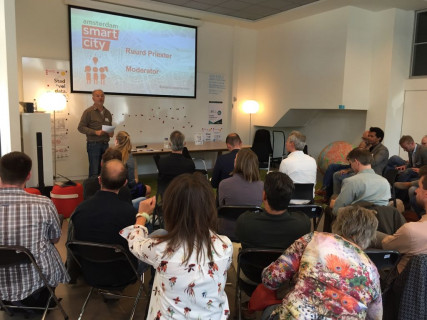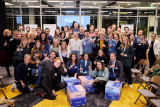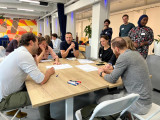In the Smart City, citizens, data and technology are the biggest enablers. That is why Amsterdam Smart City and Datalab joined forces to organize six ‘Smart Data, Smart City’ events in 2017. On the 21st of September, event number four took place. Curious about the content or feel like continuing the discussion? Read on!
This event focused on one of the Amsterdam Smart City projects that aims to make housing in Amsterdam more sustainable. Leading questions on this night were: how can data support the transition towards sustainable housing? What other purpose could that data serve? Where do challenges exist and what is the role of residents in this transition?
Marc Schoneveld, representative of the Datalab Amsterdam, presented several internet sources where you can find data. He noticed that not a lot of sources covered the energy-theme. With this statement, the starting point of the discussion was set.
Jasper Kol, initiator of Woonconnect020, gathers around a network of energy suppliers, energy advisors and contractors to create a simple, accessible web-based application that enables consumers to improve the sustainability of their homes within three mouse-clicks. His pitch and enthusiasm excited the audience. It also raised some ethical questions.
Because; why is it important to have data? Is it that important to have everything measured before you start isolating or putting solar panels on rooftops? Some initial questions from the audience, answered by Melchior Kanyemesha from Amsterdam Smart City.
Look at your street. All houses are made up from brick and mortar, all contain windows, front doors, a roof. Look closer, and you see differences in age, window size, ceiling heights et cetera. Gathering these characteristics creates a suitable environment for cooperation, whereby multiple houses can be made more sustainable simultaneously if they share similarities. For instance, when knowing 50.000 windows have the same dimensions, price arrangements can be made to efficiently swap single to double glazed windows.
Call to action
We need to collect characteristics of houses in Amsterdam, but to what extent? And perhaps more importantly, who needs to collect this data and for what purpose? We invited Ruurd Priester, research fellow at the Amsterdam University of Applied Sciences (HvA) to moderate a discussion with an expert panel of four to discuss these questions.
The panel consisted of Pepijn Post from The Sustainables, Sanne Hettinga from Geodan, Tim van Kempen from BackHOOM and Paco de Mulder from BuildingID. Their companies are searching for a central database containing detailed information about houses so that the current tailored approach to improve sustainability can be upgraded to a collectivistic approach.
What followed was a heated debate around the practical to do’s and tools that need to be developed. Within this debate, the panel shared its experience in the field and interaction with citizens, causing the discussion to focus more about the role of citizens (instead of the role of data).
This brought the audience to the centre of attention. Some praised the approach that gathers as much data as possible: being able to scan a house and know exactly what solution would fit best. To some, this approach was too technical, ignoring the social context of implementation. Someone referred to a neighbourhood-wide sustainability project in Leusden, whereby a large group of homeowners agreed to invest in sustainable solutions. Striking was the main incentive for people to improve their houses. People do not improve sustainability for financial, ecological or ideological reasons. People were not per se convinced by spread-sheet data. People do it because ‘the neighbours have one too’. This trickle-down approach should be carried out more according to some in the audience.
Continue the discussion
Since a lot of topics were discussed, there simply was not enough time to conclude certain debates. Perhaps that is why many people stayed afterwards for a drink. For those who want to make any remarks on the discussion topics, we invite you to place a comment below answering one of these questions:
- What does your government need to do to accelerate the uptake of sustainable solutions?
- What role does the private sector need to take?
- How can we accurately gather data without violating privacy laws?
- Do you think the ambition to become disconnected from the gas-grid is too ambitious/not ambitious enough?
To conclude, below are some links that were brought up during the session to check at home;
- Energie atlas: <http://www.nationaleenergieatlas.nl/>
- Data platform Amsterdam Economic Board: <https://data.amsterdameconomicboard.com/>
- Ted talk on incentives to implement sustainability https://www.ted.com/talks/alex_laskey_how_behavioral_science_can_lower_your_energy_bill
- Project Decode: becoming digitally independent. <http://waag.org/nl/project/decode>
Save the date: the next DataLab session will be held on the 2nd of November 2017.
Until then, feel most welcome on the Thursday meetups from DataLab





